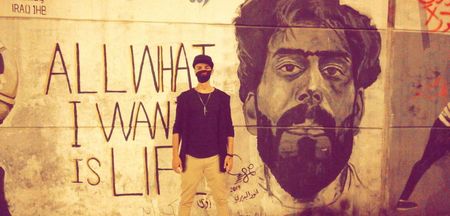BERLIN (Reuters) – Haydar Al Marjan was working in the music industry in Baghdad when he joined a protest against corruption, unemployment and poor public services. That afternoon, he said, a flying tear gas canister cost him half his face and his future in Iraq.
“It was a peaceful protest.
We were holding Iraqi flags and flowers and we marched towards the Green Zone (Baghdad’s fortified government headquarters),” Al Marjan told Reuters at a friend’s home in Berlin after making the dangerous trek to Germany via Belarus.
As he held up his mobile phone camera to document the crowd approaching the zone that day in 2019, a tear gas canister lobbed by security forces first hit, and then lodged into his face before releasing the smoke into his body.
“I fell on the ground, could only see the sky and the stars,” he said, adding that his friends called out his name, but he was unable to respond.
He spent the next five days in hospital in a coma.
His story circulated and less than a week after the Oct. 27 protest, the number of his followers on social media platform Instagram had jumped to 150,000 from 50,000.
Medical and security sources said 77 people were injured that day as the protesters stood fast in Baghdad’s central Tahrir Square despite the deaths of 74 people the previous two days as security forces and militia sought to disperse them.
Al Marjan underwent surgery in Iraq to remove the canister but went to India for two more operations because his home country lacked the necessary facilities.
A human rights activist footed the bill of $15,000 for the first operation.
Angered by his injury, he used his social media profile to protest, and received death threats in return. He decided to leave Iraq in September 2021, having heard from friends about a new, more affordable migrant route via Belarus to Europe.
It was riskier to stay than to leave, he said, even though he had a really good life in Iraq.
“I was a middle class citizen living in Baghdad.
I had a home, a car and I was working in the music industry and had a YouTube channel” Al Marjan said.
He flew to Minsk through Dubai and paid $3,000 to traffickers he found on Facebook.
He spent four days with his friends in the forest near a road running between Belarus and Poland.
Some travellers have been killed by the freezing temperatures, but he was shielded by clothes he had managed to bring from Iraq while waiting for a way to evade police who arrested everyone who tried to cross.
“We monitored the road and at some point it was empty.
And then we ran,” he said, adding a group of families who came right behind him and his friends were stopped.
Nearly half of the 11,000 migrants who have travelled from Belarus to Germany through Dec.
14 this year came in October. Al Marjan was among them, arriving in Germany on Oct. 14.
He applied for asylum and said he has been given indications that he has a very good chance of being allowed to stay.
“This is the country I want to belong to,” he said.
“The country I can defend. The country that did not cause harm to me but helped me.”
(Reporting by Nada Nader Youssef; editing by Philippa Fletcher)












